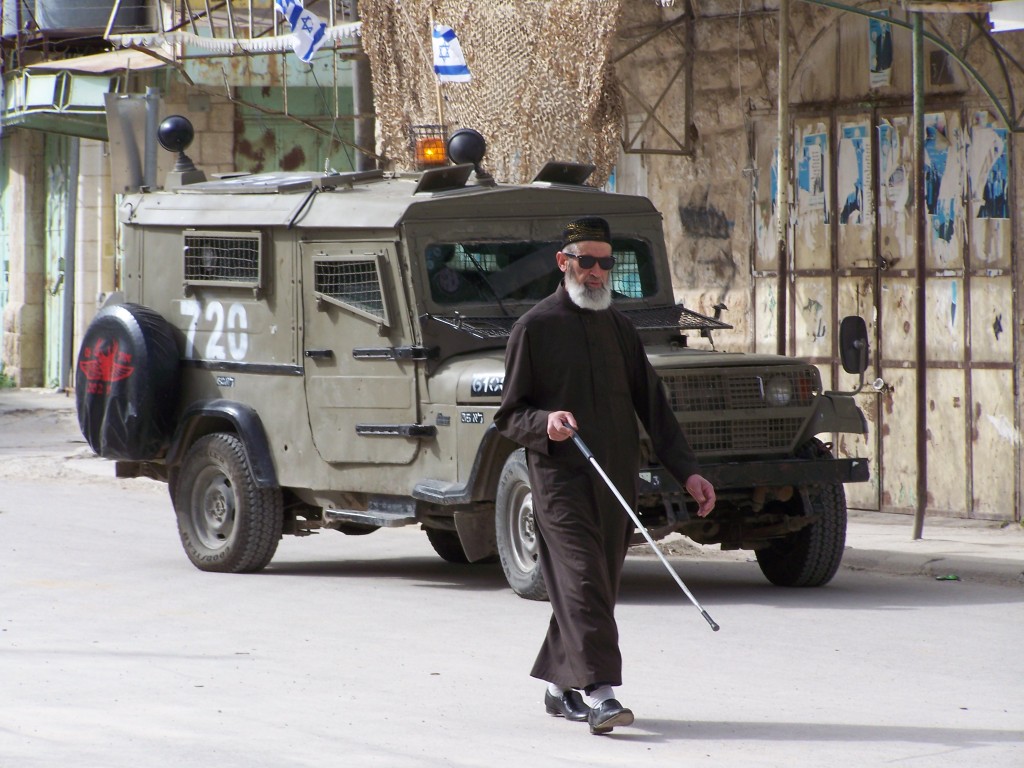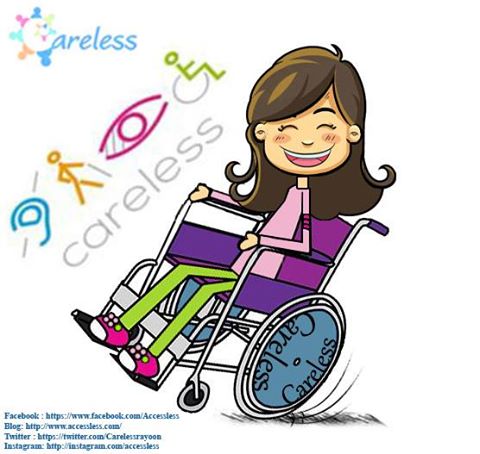The occupational handicaps of being Palestinian
Living with disability is always a challenge but if you're a Palestinian living under Israeli occupation you are doubly handicapped.

Wednesday 27 May 2015
Having lived my whole life with disability in different parts of the world, I thought I knew what most of the difficulties that any disabled person would experience. But in the places I have lived, the main issue I've encountered were societal attitudes, which almost exclude you from living an ordinary life. But what happens when you are not just fighting social prejudice, but also confronting a military occupation?
I was born in Mosul, Iraq, and spent the first 10 years of my life living there in a society that tended to reject anyone who was different, let alone a person with disability. As a child, I never encountered any other disabled person, which made me feel quite special but also taught me to rely on my inner strength to resist isolation and marginalisation. During my time in Mosul, Iraq was at war with Iran. But being a child under the protective wings of my family, I believed that, even in a conflict, my experiences were essentially no different to those of other children. With this in mind, I naively thought that the same probably applied in Palestine, but the reality is quite different.
However, I have come to learn that being disabled in a country that has been made ‘disabled' by occupation and repression is a tough call. “We suffer double the sufferings of the people in Palestine,” asserts Latifa , a disabled young woman from Gaza in her late 20s whom I recently met, along with Suleiman, who is 21 and suffers from cerebral palsy.
Both Latifa and Suleiman receive support from a programme run by Medical Aid For Palestinians called ‘Rehabilitating people with disability to regain their rights'. The scheme aims to improve the quality of life for disabled Palestinians, to teach them to advocate for their rights and to promote positive attitudes towards them in the community.
For disabled Palestinians in general, there is a shortage of medical and health specialists, while their environment is largely not adapted to their needs. In such a situation, people with disabilities tend to feel powerless and at fault for their predicament. This is especially the case when it comes to education. People with hearing impairment have no access to university education and the visually impaired are deprived of some university degrees.
Within the occupied Palestinian territories, there is also a clear geographical disparity between the West Bank and Gaza. “[There is] no electricity available [but] you are still expected to climb up to the 5th floor, as even generators are not always working due to fuel shortages,” describes Latifa. “I have to walk long distances also because of the shortage of fuel for cars.”
During the 2014 war, the risk and danger for people with disabilities was much higher than for the able-bodied, Latifa explains, as it is much harder for the handicapped to evacuate their homes and seek shelter or move from the top floor to the basement. As Israeli bombs don't differentiate between the disabled and the fit, this is tragically the nearest to equality that people with disability can often expect.
Moreover, Gaza's disabled population ballooned as a result of the war. “Imagine you find yourself in a wheelchair overnight, or lose your limbs or eyesight, and you don't know why this happened to you or how to adapt to it – all because you are born Palestinian,” Latifa says. “Plus mental health [problems] are also on the increase due to the psychological abuse that Palestinians have to endure on a daily basis because of the Israeli occupation.”
According to MAP, over 87% of Palestinians with a disability are unemployed and one third of them will never be able to get married. Over one third of Palestinians with a disability have never been to school, whilst many do not use public transport as it is not adapted sufficiently. It is these practical barriers which make living with a disability extremely hard under occupation.
MAP's programme trains people with disability in how to campaign for specific rights and improve public awareness of the reality that the handicapped do not need pity, but need empowerment and enhanced accessibility, so that they can lead more independent, productive and fulfilling lives. The programme also strives to help disabled people to campaign for equal opportunities and rights.
Before becoming involved with the programme, Latifa saw herself as having a “problem” and wanted to hide from people, block out her disability and try to live without confronting it. Today, she regards disability as a collective cause rather than a personal problem. Latifa firmly believes that society needs to provide help for people with disability to integrate. Strength comes in numbers so people with disability will have more of a chance to gain their rights if they all unite.
The long years isolation Palestinians, especially in Gaza, have suffered due to the occupation has led to a widespread unawareness of the opportunities and facilities that are available for people with special needs, or even that such people have “special needs”.
The situation is compounded by social prejudices, such as sexism, which is even more pronounced for disabled women. This was exemplified in the case of Amal, whose grandmother refused the age-old Palestinian tradition of bestowing her name on her granddaughter because she was “deformed”.
Latifa is convinced that she faces more prejudice than her able-bodied sisters. “We are not allowed to leave the house or go outside for fear of harassment,” she points out, adding that a disabled woman is often “not even considered suitable for marriage because a disabled woman represent a ‘problem' that is inherited through the generations, who is not able to work or carry out her duties and is not ‘the perfect' model.”
This extra sexism affects how disabled Palestinians relate to their disability, with a clear gender difference. While Suleiman was open and direct and had no qualms about telling me that he was born with Cerebral Palsy, Latifa refused to talk about her condition, seeing the question as an invasion of her privacy, insisting that “I am Latifa; a human and not a name of a condition.” I sensed that Latifa was still not completely comfortable with her disability.
Despite all these efforts, Palestine is still a long way away from integrating its disabled citizens. Suleiman believes that stone is easier to shift than attitudes. “It is harder to change people than alter buildings,” he believes.
Young people should be the main focus of future initiatives, suggests Suleiman, so as to shape a generation that is more enlightened in its attitudes towards disabled people and their untapped potential. Both he and Latifa prefers job-creation schemes to help disabled people enter the market and prove that their condition is no handicap. “I don't want to rely on handouts. I want to be able to say I contributed to making something,” he insists. “This is how we are and we have rights,” he adds, stressing that being seen as charity cases “is demeaning.”
At the end of our encounter, I asked both Suleiman and Latifa about their dreams. Suleiman, the more confident one with a rather charming character, was the first to reply, saying he wished to become a political analyst. “You need to work and believe in yourself to convince others of your ability like I am working on achieving my dream of becoming a political analyst,” he said. Latifa refused to share her aspirations believing that it was a “private matter but being disabled does not mean we have different dreams”.
“Society is diverse and diversity is helpful in society,” she proffered instead. “Essentially, we are simple human beings: we love like you, we smile like you, when we are hurt, we cry … I long to live in peace and stop being labelled as a terrorist, I long for the day that Palestinians are not stopped at checkpoints.”
Finishing on a more hopeful note, Latifa recalled how, as she entered Israel on her way to London, she saw an Israeli bus full of children: “I smiled at them [and] they smiled back for one simple reason: we have one thing in common, humanity.”

